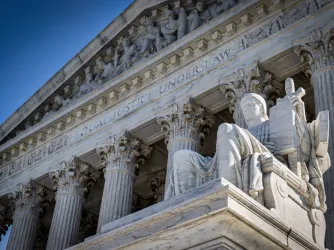Table of Contents
At Penn State, Protests and Arrests Raise Questions about Free Speech on Campus
Pennsylvania State University (PSU) student newspaper The Daily Collegian reported last week that 31 PSU students were arrested and charged with criminal trespass for staging a daylong sit-in protest inside the Old Main, a PSU building. The protesters, who sought to raise awareness about PSU's failure to join the Designated Suppliers Program, an anti-sweatshop initiative, were arrested after failing to disperse at 5:00 PM, the building's closing time. The next day, protesters were again asked to leave the building and the surrounding premises after handing out flyers to university visitors participating in the Old Main Open House, a promotional event for the university. The Daily Collegian reported that protesters were asked to leave the area by Penn State police and an Alumni Association member, but were not told which policy they were violating.
Penn State, as a public university, has a right to enforce reasonable time, place and manner restrictions of free expression on campus, as long as such restrictions are narrowly tailored to achieve a legitimate government purpose. As such, the arrest of the protesters participating in a sit-in in a university building is likely legally defensible, if arguably unduly harsh. However, the forced dispersal of protesters the following day is potentially more problematic, particularly if the protesters were simply handing out flyers on the lawn in front of the Old Main.
The distinction lies in the fact that while regulating the hours of use of a university building in a content-neutral way—e.g., closing the building to all students and faculty regardless of their affiliation or viewpoint at a previously arranged time—may fairly be considered a narrowly tailored means of achieving a legitimate government purpose, silencing students engaged in peacefully protesting a public university's labor practices in a public space outdoors during a promotional event is less readily justifiable.
PSU should be aware that federal courts have shown a willingness to err on the side of more expression rather than less when it comes to regulating when and where students may congregate to engage in speech activities. In Roberts v. Haragan, 346 F. Supp. 2d 853 (N.D. Tex. 2004), for example, a federal court held that "to the extent [that a] campus has park areas, sidewalks, streets, or other similar common areas, these areas are public forums, at least for the University's students, irrespective of whether the University has so designated them or not."
Student columnist Jim Tuttle, writing in Monday's Daily Collegian, quickly got to the crux of the matter. Tuttle writes:
I was curious to see if there was anything in the University Policy Manual that might justify shutting down a peaceful demonstration in a public outdoor area like the Old Main lawn. There is no rule against non-violent, non-disruptive distribution of fliers, even if that activity takes place in a place and time that the administration might deem bad for public relations.
The first line of the university policy regarding "use of outdoor areas for expressive activities" states that "a university is inherently a marketplace of ideas, and Penn State encourages and protects the rights of members of the University community to express divergent viewpoints and opinions on matters of concern." The policy then stipulates that demonstrators must spread their message with civility and regard for safety and asks that they not disrupt classes.
I fail to see how the distribution of fliers outdoors could have disrupted tours to the Old Main bell tower. Perhaps their presence on the lawn below created an unpleasant view from above for conflict-shy administrators.
Regardless of which side of the debate you might be on, these students were simply exercising their first amendment rights. I'm happy to see that such a tradition is still alive at a university where student protesters in the past have spoken out publicly about the war in Vietnam, civil rights and other important issues.
With Penn State's history and reputation in mind, members of the university administration and the alumni association should be proud to show visitors to our campus that members of the student body have both the presence of mind and the inalienable right to speak out about the issues they care about.
We agree with Tuttle: peaceful protest and vigorous discussion should be considered hallmarks of an intelligent and engaged student body taking advantage of the university's unique role as an unregulated marketplace of ideas, not reasons for shame and censorship.
FIRE will continue to monitor the situation at Penn State as events unfold.
Recent Articles
Get the latest free speech news and analysis from FIRE.

The federal charges against Don Lemon raise serious concerns for press freedom

The American people fact-checked their government

California prohibits its teachers from talking about a student's gender identity to their parents. That raises First Amendment concerns.
